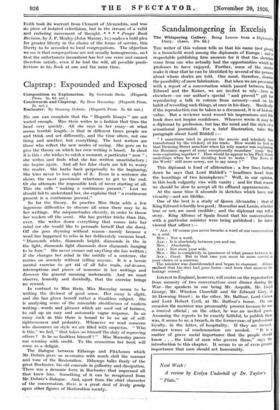Scandalmongering in Excelsis
The Whispering Gallery. Being Leaves from a Diplomat'' Diary. (Lane. 10s. 6d.) THE writer of this volume tells us that his name (not given) is a household word among the diplomats of Europe ; and a respectable publishing firm answers for it that the sketches come from one who actually had the opportunities which he professes to have enjoyed. Further, some of the stories make it clear that he can be identified by several of the persons about whom stories are told. . One must, therefore, dismiss the possibility of mere fabrication. But when we are presented with a report of a conversation which passed between King Edward and the Kaiser, we are invited to rely—here as elsewhere—on our author's special " and proved " gift for reproducing a talk in extenso from memory—and on his habit of recording such things, at once in his diary. Manifestly if the reproduction can be taken as a document, it is of historic value. But a reviewer must record his impressions, and this book does not inspire confidence. Whoever wrote it may be a diplomat by profession, but has the mind and the style of a sensational journalist. For a brief illustration, take this paragraph about Lord Riddell :— " I sometimes tried to picture the ascetic and scholarly face transformed by the trickery of his trade. How would he look in that Downing Street armchair when his wily master was explaining the Messianic aspect of some exceptionally mundane ' coup ' they were cogitating together ? How would he appear to his Fleet Street underlings when he was deciding how to make ' The News of the World ' still more newsy, not to say nosey ? "
This diplomat is fond of alliteration ; a few lines further down he says that Lord Riddell's " headlines howl from the hoardings of two hemispheres." Well, in our opinion, in this book vulgarity vies with vanity ; and for that reason we should be slow to accept all its offhand appraisements.
At the same time it abounds in sketches which have real vivacity—and are lifelike.
One of the best is a study of Queen Alexandra ; that of King Edward is hardly less good ; Mussolini and Lenin, whether true or not, are most credible ; and the diplomat can tell a story. King Alfonso of Spain found that his conversations with a particular minister were being published : he inter. viewed that officer :— " ALF. : Of course you never breathe a word of our conversations to a soul.
- • Mrs.: Not a word.
ALF. : It is absolutely between you and me.
Mix.: Absolutely. ALF. : Not even your wife. Mrs.: She is completely in ignorance of what passes between us. ALF. : Good. But in that case you must be more careful in your choice of a mistress.
The minister was dumbfounded and began to stammer. Alfonso realised that his shot had gone home—and from that moment the leakage ceased."
Interest in England, however, will centre on the reproduction from memory of two conversations over dinner during the War—the speakers in one being Mr. Asquith, Mr. Lloyd George, Mr. Winston Churchill and Sir Edward Grey, at 10 Downing Street ; in the other, Mr. Balfour, Lord Carson and Lord Robert Cecil, at Mr. Balfour's house. On one occasion the narrator was presumably present because he was a trusted official ; on the other, he was an invited guest. Assuming the reports to be exactly faithful, to publish them was, it seems to us, a breach, in the former ease, of professional loyalty, in the latter, of hospitality. If they are inexact, stronger terms of condemnation are needed. " It is a matter of grave social importance that the people should know . . . the kind of men who govern them," says the introduction to this chapter. It seems to us of even greater 'mportance that men should act honourably.






























































 Previous page
Previous page